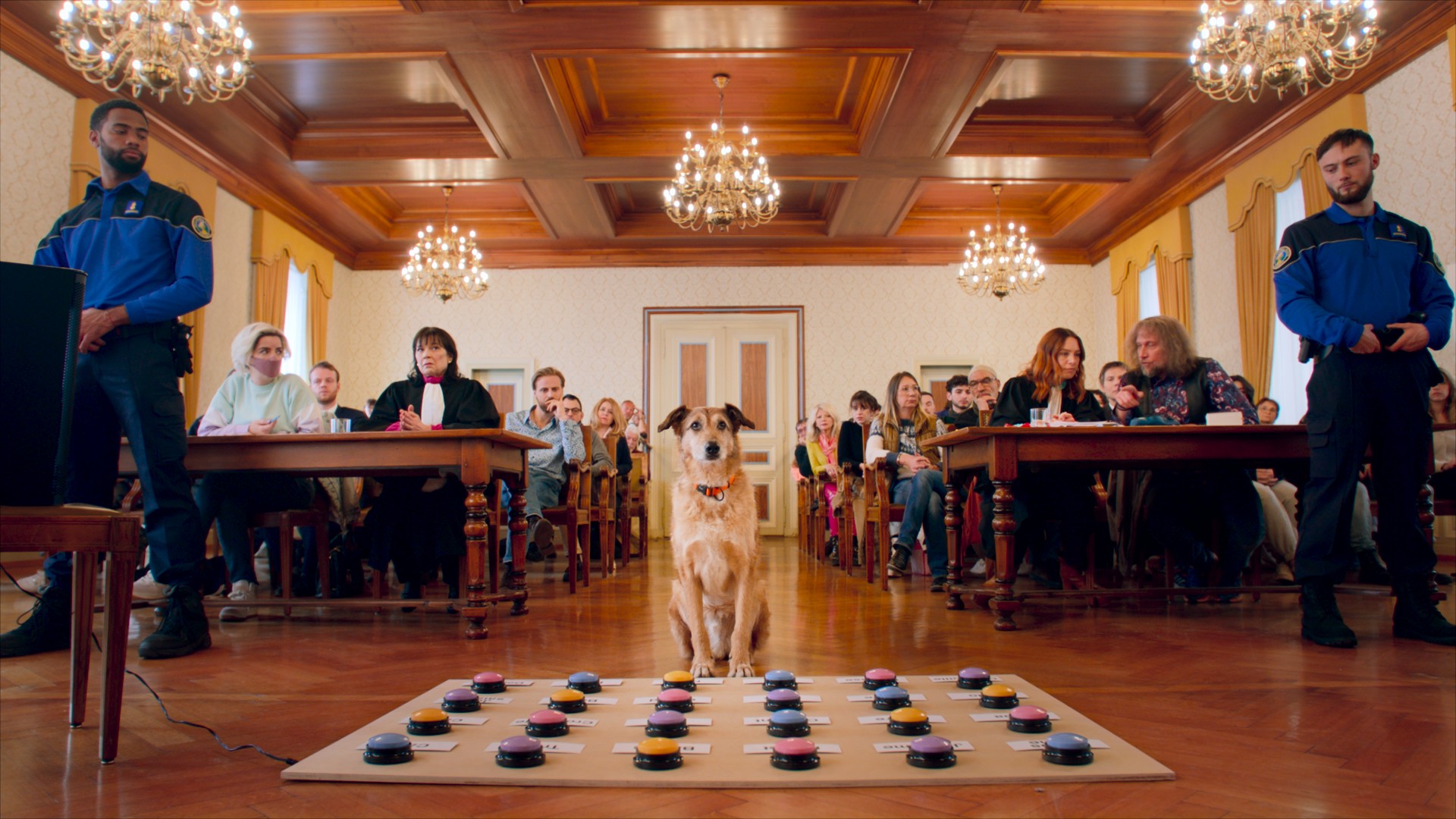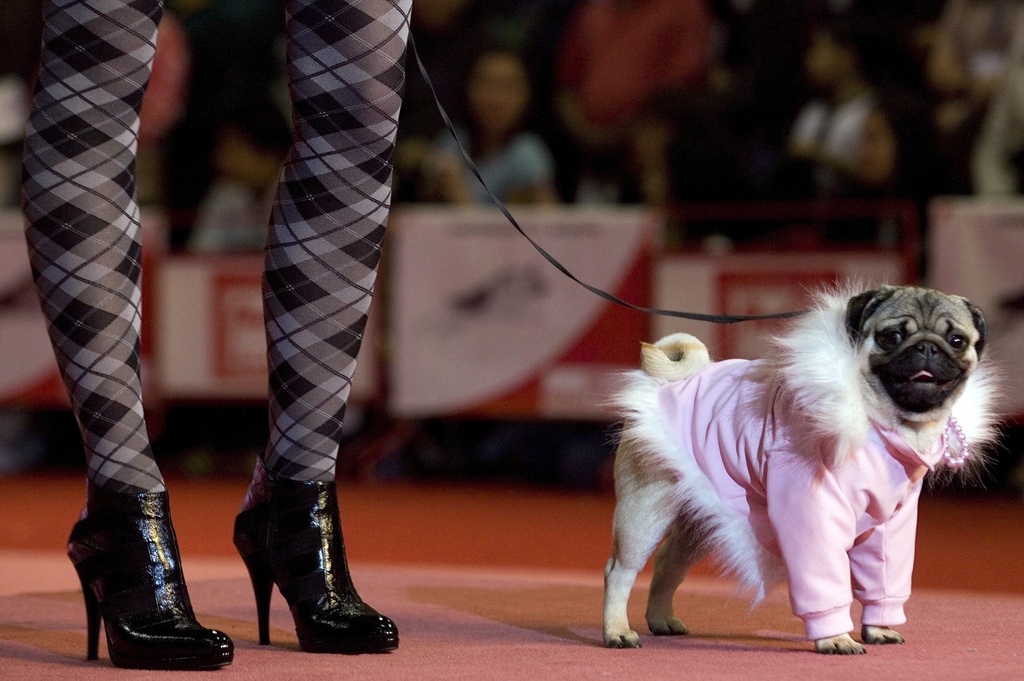
Animal rights in court: Swiss-French film wins first Palm Dog Award at Cannes

Swiss-French actor and director Laetitia Dosch took home an unprecedented award for Le Procès du Chien (Dog on Trial). She discusses her animal-whispering gifts and the serious issues behind the comedy.
Last month at the Cannes Film Festival, while many attendees were cheering for Sean Baker’s Palme d’Or winner Anora, Switzerland brought home an equally prestigious award, celebrated mostly by those with an acquired taste and a deep love for humans’ best friends: the Palm Dog.
Starring in Dosch’s directorial debut Dog on Trial, eight-year-old Kodi plays Cosmos, a troubled and sometimes aggressive griffon who risks being put down after biting three people.
He walks in the pawprints of fellow canine Messi, the star of last year’s winner of the Palme d’Or, Anatomie d’une chute (Anatomy of a fall) by Justine Triet.
Unfortunately, Kodi was not available for interviews, but Dosch kindly agreed to talk to SWI swissinfo.ch about Dog on Trial on the windy terrace of the Palais des Festivals in Cannes.
Dosch also portrays the role of April, a thirtysomething lawyer who agrees to defend Cosmos and assist Dariush, his grumpy human companion. Although April doesn’t initially show a particular affection for dogs, she gradually falls for Cosmos’ charm.
In court, April must contend with the notorious lawyer-politician Roseline Bruckenheimer, who insists Cosmos be sentenced to death regardless. Bruckenheimer attempts to persuade the court that Cosmos only bites women, labelling him a “misogynist”, thereby sparking a public clash between feminists, environmental activists, animal rights defenders and anti-immigrant groups.

Animal whisperer
Dosch explains how this was not the first time she had to share the spotlight with an animal. In 2018, she put on a theatre play titled Hate (Tentative de duo avec un cheval)External link in collaboration with Yuval Rozman, in which her acting partner was Corazon, a majestic pure Spanish breed horse.
After the show, her producer told Dosch that if she could work with a horse, she could very well be a director. “Which actually has nothing to do with directing!” Dosch says, laughing.
Recalling the play, she says that ecology, feminism and our relations with other species are topics that run through her work.
She also says that the original idea for the film came from one of the spectators of her play who told her of a trial in Switzerland where the owner of a dog who had bitten three people was taken to court and the dog risked being put down. The trial sparked protests and debates.
While researching the topic, Dosch came across a similar case where an appeal reached the European Court of Human Rights. But the dog was killed anyway, before the case was judged.
When asked what in particular appealed to her in these cases, Dosch responds that “animals’ legal status is not clearly defined. When the answer is not clear, there’s passion – a place that allows us to think and dig deeper”.
Populism and human beasts
Dog on Trial is a drama that addresses serious social, ethical and political issues in a light-hearted manner. Drawing inspiration from comedies with messy protagonists such as the television series FleabagExternal link and the peculiar humour of Louis C.KExternal link., Dosch once again embodies her chaotic persona, reminiscent of her previous roles in films such as Jeune femme (Young woman) and Justine Triet’s first film, La Bataille de Solférino (Age of Panic).

As a director and screenwriter, Dosch makes observations about populist leaders, embodied in Bruckenheimer’s character, that hit the mark. Similar to politicians like former United States President Donald Trump or right-wing French politicians Marine Le Pen or Eric Zemmour, Bruckenheimer’s character and mannerisms serve as a bitter reminder of how easily public opinion can be manipulated and distorted through the use of pointed discourses.
However, attempting to draw parallels between the conditions of women, immigrants, non-human animals and other disadvantaged groups in society feels like a very ambitious endeavour. Consequently, the humorous tone of the film doesn’t fully do justice to the intersectional approach it attempts to highlight.
Dosch never tries to impose an opinion, nor does she didactically defend her position on the issues discussed in the film; through her character, she even expresses her own confusion and loss when facing some of the problems.
Especially regarding animal rights, she pinpoints the problems but makes it clear that there isn’t an absolute truth or an ultimate right way to solve them, at least for her – which is a courageous and honest position to take rather than hiding behind preconceived and generalised doctrines.
Dog acting is not a trick
Dosch’s connection to animals goes back a long way. “I think it’s connected to my childhood in a weird way. I lived with my uncles and grandparents. There were many people in the house, but also many animals. In our house there were pets who were like our friends, but there were also taxidermied animals hung on the walls.”

Her grandfather was an ornithologist. “He loved birds,” she says. “However, his way of showing his love was to go to the nests, steal the eggs, put them in boxes, and make a collection. He had one of the biggest collections of eggs in Europe. So, the question of respecting what you love or loving without respect has been very present since my childhood.”
Dosch describes the casting for the cute-but-troublesome canine in the film as crucial, where she and her crew observed dog trainers as much as their dogs. According to Dosch, many trainers presented their dogs like show tricks.
Following several unsuccessful attempts, one night she talked about the casting on the radio and was later sent Kodi’s showreel. “Kodi was a very special dog,” she says. “He’d been living on the streets for years, then was rescued and started to work with his dog trainers.”
The biggest challenge Dosch and her team encountered was when they realised Kodi couldn’t howl: “We were afraid because it was very important for the script,” Dosch says. “We asked the special effects team if they could fake howls, but it was so expensive. They eventually discovered that if they imitated the sound of a kitten meowing, it made Kodi howl.”
Regarding what exactly made Kodi suitable to play Cosmos, Dosch praises his physical talents. “I really liked all the emotions and vitality he had on his face. If you watch his showreel, you can see that he can do incredible things. I put all these tricks in the script, but in the edits, I decided to cut almost everything, except for one scene in the courthouse that was important for the plot. If I had kept them, Kodi would have looked like a showman and that wasn’t something I wanted.”
Bright women behind star dogs
Regarding her relationship with Triet, with whom Dosch collaborated in 2013 for La Bataille de Solférino, Dosch says she met Triet at a concert 13 years ago, and something clicked for both of them.
Dosch and Triet also have a quite serendipitous connection, as both directed a court drama involving a dog at Cannes one year apart.

“This is a very funny story,” Dosch says. “Four years ago, we were both coming back from Cannes and sitting across from each other. She told me she was writing a film about a trial, and I said, ‘Me too!’ She said there was a dog in her story. Mine had a dog too! Her script had a child and a blind character, and mine did too. I couldn’t help but think, ‘Now I’m ruined!’ Joking aside, I was quite afraid actually. I even thought about changing the subject that I’d been working on for a year. I honestly don’t know – the coincidences probably came from our subconscious.”
Edited by Virginie Mangin and Eduardo Simantob/ts

More
Animal lawyer ‘accidentally’ sacked

In compliance with the JTI standards
More: SWI swissinfo.ch certified by the Journalism Trust Initiative


























You can find an overview of ongoing debates with our journalists here . Please join us!
If you want to start a conversation about a topic raised in this article or want to report factual errors, email us at english@swissinfo.ch.